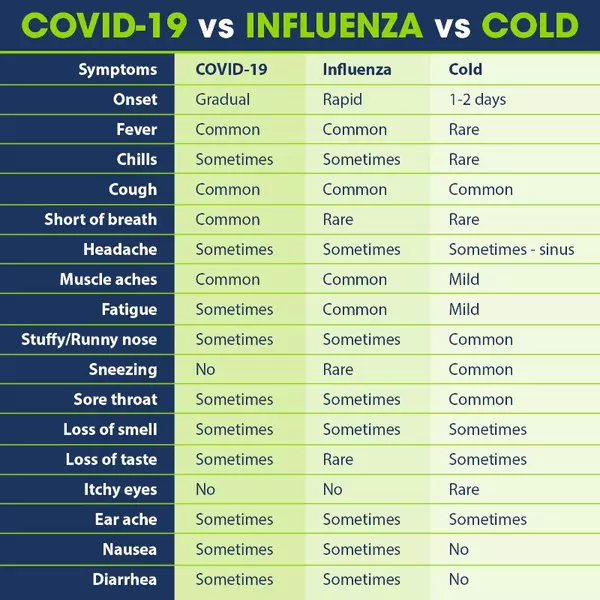
How to tell if you have a cold, the flu or COVID-19
Cooler temperatures and the start of the school year signal the start of seasonal sicknesses. Viruses that cause common colds and the flu will mix with COVID-19 and make it difficult to know what’s making you ill. Gundersen's Infection Preventionist Megan Meller helps tell them apart.

What are the symptoms of a cold, the flu and COVID-19?
Cold symptoms include:
- Cough
- Runny or stuffy nose
- Sneezing
- Sore throat
COVID-19 and the flu share symptoms, including:
- Fever and chills
- Chills
- Cough
- Fatigue
- Sore throat
- Runny or stuffy nose
- Muscle pain or body aches
- Headache Vomiting or diarrhea
- Shortness of breath or difficulty breathing (more common with COVID-19)
- Change in loss of taste or smell (more common with COVID-19)
Am I at higher risk for serious illness from COVID-19 or flu?
Let’s be clear: Both COVID-19 and flu can result in severe illness, complications, hospitalizations and even death. What’s scary about COVID-19 is that healthy people with no known risk factors can get seriously ill. We don’t know yet why some people get really sick from COVID-19 and others don’t.
High-risk groups for flu complications:
- Adults 65 years and older
- Pregnant women
- Children younger than 2 years old
- Adults with chronic health conditions including asthma, diabetes, heart disease, and immunocompromised
High-risk groups for COVID-19 complications:
- Adults 65 years and older
- People with certain underlying medical conditions
- Pregnant women
Some of my symptoms match each virus. How do I know what I'm sick with?
Getting tested for COVID-19 and the flu is the easiest way to narrow down what might be making you sick.
You should get immediate emergency care if you have:
- Trouble breathing
- Persistent pain or pressure in the chest
- New confusion
- Inability to wake or stay awake
- Pale, gray, or blue-colored skin, lips, or nail beds, depending on skin tone
What are the treatment options for a common cold, or mild cases of the flu or COVID-19?
Decongestants, saline rinses and pain relivers can help with symptom relief. You should also:
- Drink lots of water, juice, or broth to replace fluids lost from a fever
- Use a cool mist humidifier to help ease congestion and coughing
- Prop yourself with 2 or 3 pillows to make it easier to breathe or sleep
- Limit the level and frequency of physical activity
What are the treatment options for flu?
Some people may benefit from a flu antiviral to speed recovery, especially if they are at higher risk of complications. Antivirals are not sold over the counter and must be given within 48 hours from when symptoms begin. Talk to your medical provider to see if antiviral treatment is right for you.
What are the treatment options for COVID-19?
For people at high risk of disease progression, your healthcare provider might recommend that you receive additional treatment. They will decide whether additional treatments are appropriate for you.
When should I seek treatment for the flu?
Antiviral medications can help if there is a risk of severe illness or there is close contact with individuals at high risk for flu complications. Treatment can help if you’re:
- Seriously ill
- Pregnant
- Older than 65 years old
- Younger than 2
- Immunocompromised
- Have co-morbidities that increase your risk for severe complications, including lung disease, cardiac disease and obesity
- Sick and living with someone who is a higher risk of severe complications from influenza, including expecting mothers and those who are immunocompromised
- Working in healthcare
- Working in a nursing home
Is there anything I can do to protect myself from serious illness, hospitalization or worse?
Get vaccinated. It’s that simple. The COVID-19 vaccines are available now to everyone 6 months and older. Flu shots are now available during some clinic appointments, while Gundersen will hold its annual flu shot clinics later this fall. You can receive both vaccines at the same time, although we recommend the COVID-19 vaccine immediately. Visit the Vaccination Services page to learn more.
Related articles

Emplify Health by Bellin & Gundersen 2025 Wellness Draft

This new minimally invasive heart procedure is already saving lives

Surviving norovirus and how to recover quickly

How to stay active in the winter